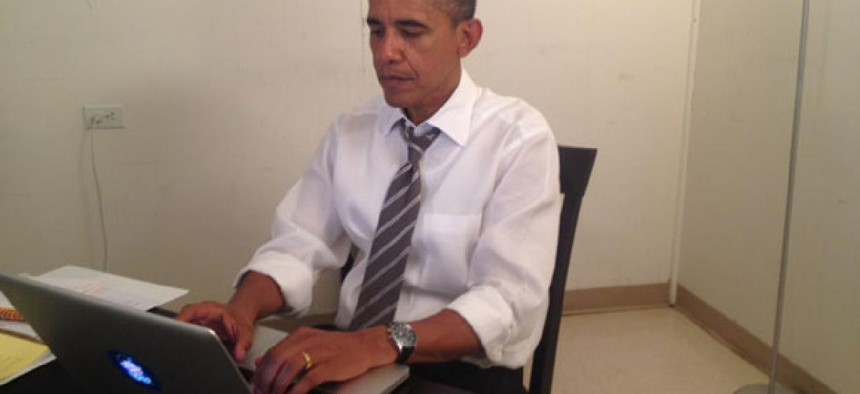What to expect on technology in Obama's second term

White House photo
Many changes could be on the horizon for president.
Obama’s regulators arrived in January 2009 with a laundry list of priorities they have largely achieved—a version of network neutrality called the “Open Internet” rule; more spectrum for wireless broadband networks; subsidies for those who don’t yet have broadband access; and limits on how much telecom companies can charge for access to high-speed lines.
The second term will fill in the few blanks left by the first term, probably with new leadership at the Federal Communications Commission. At the same time, industry leaders and regulators want to ease the transition from the current hybrid analog-digital telecom system to a digital Internet Protocol-based system run on fiber-optic lines. “What FCC will do next is try to figure out how to have a rational IP transition, just as we had a digital television transition,” says Blair Levin, a former FCC official whose name has been mentioned as a possible chairman.
This transition could update the 1996 Telecom Act, which would give legislators a chance to contest the FCC’s Open Internet plan. Already, courts are poised to rule that the administration cannot impose network neutrality by fiat. So Democrats in Congress (urged on by the alliance of consumer watchdog groups and Internet companies that fended off the copyright legislation known as SOPA and PIPA) will try to enshrine neutrality into law. Standing alone, the effort would probably fail in the House. But GOP members might agree to net neutrality for the sake of broader deregulation. They don’t want broadband regulated under existing telecom laws; if they’re exempted, the big providers will have a freer hand in building and managing fiber networks.
Meanwhile, the 2011 American Invents Act, a patent law, needs a raft of technical corrections that could reignite issues that the measure was meant to settle. One correction would tighten rules for challenging patent grants, and would make life more difficult for companies that amass patent portfolios for the sake of suing infringers. These nonpracticing entities, sometimes called “patent trolls,” will look to avoid corrections that frustrate their business practices. Regulators frustrated by this trend have begun to see antitrust problems in the intellectual-property arena. The Federal Trade Commission, for instance, is planning to sue Google (probably this year) for restricting access to key smartphone patents. Another antitrust suit (moving more slowly through the system) could charge Google with hurting competitors by favoring its own search results.
Democrats and Republicans in Congress have also failed to agree on cybersecurity. Should they enforce minimum security standards on critical digital networks owned by private firms—or permit companies to create their own cybersecurity guidelines? Senate Majority Leader Harry Reid has pledged to bring up the issue in the lame-duck session, but if nothing happens, the administration will likely issue an executive order late this year or early next.






